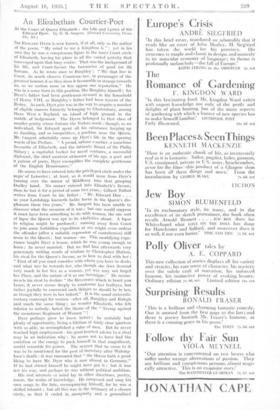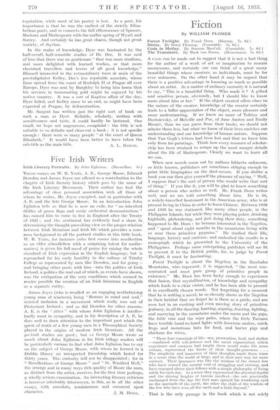An Elizabethan Courtier-Poet
Sin EDWARD DyEat is now known, if at all, only as the author of the poem; " My mind to inc a Kingdom is " ; yet in his oWn day he was a conspicuous figure in the inner Court circle of Elizabeth, having his place in all the varied activity that , Converged upon that busy centre. That was the background of his life, and Court-favour the barometer of good (or ill) :kortune. As he wrote once to Burghley : " We that live in Court, do much observe Countenaunce, in personages of the greatest honour, & as they show it favourable or strange towards .us, so we reckon more or less uppon our reputation." He Was in a sense born to this position, like Burghley himself ; for ))Yer's father had been gentleman-steward in the household: cf Henry VIII, as Burghley's father had been Groom of the RObes. As such, Dyer *re was in the way to acquire a number of eligible manors fOrmerly belonging to Glastonbury, among them West' n Zoyland, an island of high ground in the middle of Sedgemoor. The Dyers belonged to that class of smaller gentry whose fortune the Tudors made ; though, as an individual, Sir Edward spent all his substance keeping up so dazzling, and so competitive, a position near the Queen. Mr. Sargent admirably sums up Dyer's life in the opening words of his Preface. " A proud, urbane courtier, a sometime favourite of Elizabeth, and the intimate friend of Sir Philip Sidney ; a, capitalist backer for naval ventures, it successful diplomat, the chief amateur alchemist of his age, a poet and patron, poets, Dyer exemplifies the complete gentleman of the nglish Renaissance."
He seems to have entered into the, privileged circle under the aegis* of Leicester ; at least, so it would seem from Dyer's turning , over the. manor, of Middlezoy into that grasping 'Dudley, hand. , No sooner entered into Elizabeth's favour, Allan, he lost it for a period of some two years; Gilbert Talbot writes from ,Court to his father ; " Mr. Edward Dier . . . as your Lordshipp knoweth hathe beene in the Queen's dis- pleasure these two, years." Mr. Sargent has been unable to discover what the occasion of it was ; but one would suppose it must have been something to do with women, the one sort of lapse the-Queen was apt to be vindictive about. A lapse in religion might be pardoned ; running away from Court to join.. some forbidden expedition ,at sea might even endear the offender ;(after a suitable expression of contriteness) still more, to the Queen ; but women—no. This mortifying expe- .rience taught Dyer a lesson, which he was young enough to learn he never married. But we find him afterwards very .gerierously writing words of wisdom to Christopher Hatton, his rival for the Queen's favour, as to how to deal with her : " First of all you must consider with whom you have to deale, and, what Wee be towards her, who though she does descend very much in her Sex as a woman, yet wee may not forget her Place, and the nature of it as our Sovraigne." He recom- incnds his rival to declare " the Reverence which in heart you beare, ,& never sceme deeply to condemn her, frailtyes, but rather joyfully to commend such thinges as should be in her, sus though they were in her indeed." It is the usual sixteenth- fun tury contempt for women—after all, Burghley and Ralegh said much the same thing ; no wonder Elizabeth, who felt inferior to nobody, hated the theme of the " Trump against the monstrous Regiment of Women " I Dyer perhaps ,grew to know better ; he certainly had plenty of opportunity, living a lifetime at fairly close quarters with so able, so accomplished a ruler of men. But he never reached high employment—his good-hearted advice to a rival may be an indication why ; he seems not to have had the ambition or the energy to push himself in that magnificent, sordid scramble for power. The nearest that he came to it was to be mentioned for the post of Secretary after V{Talsing- ham's death—it was rumoured that " the Queen hath a great liking to have Mr. Dyer who is now absent in Germany."
lie had stirred himself he might have got it ; but it was not his way, and perhaps ha was without political ambition.
His real interests of mind lay in other directions, poetry, music, the realm. of knowledge. ,, He, composed and sang his own songs to the ;bite, .accompanying himself, for he was a skilled lutanist ; but all this,was in the intimacy of a chosen circle, so that it ended in anonymity and a generalized
reputation, while most of his poetry is lost. As a poet, his importance is that he was the earliest of the strictly Eliza- bethan poets, and so connects the full efflorescence of Spenser, Marlowe and Shakespeare with the earlier spring of Wyatt and Surrey. And certainly he has great charm, though not great variety, of rhythm.
In the realm of knowledge, Dyer was fascinated by the half-occult, half-scientific studies of Dr. Dee. It was said of him that there was no gentleman " that was more studious, and more delighted with learned workes, or that more cherished travellers and lovers of all good knowledge." Himself interested in the extraordinary tours de main of the prestidigitator Kelley, Dee's less reputable associate, whose fame spread from the court of Rudolph II at Prague all over Europe, Dyer was sent by Burghley to bring him home that his services in transmuting gold might be enjoyed by his native country. It was a sort of Kapitza affair of the day. Dyer !idled, and Kelley came to an end, as might have been expected at Prague, by defenestration.
Mr. Sargent has written just the right sort of book on such a man as Dyer. Reliable, scholarly, written with sensitiveness and taste, it could hardly be bettered. One Sitio% we hope not ungenerous, complaint : the title is not suitable to so definite and clear-cut a book ; it is not specific enough : there'were so 'many people " at the court of Queen Elizabeth." It would have been better to have taken the



































 Previous page
Previous page